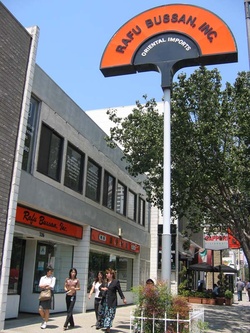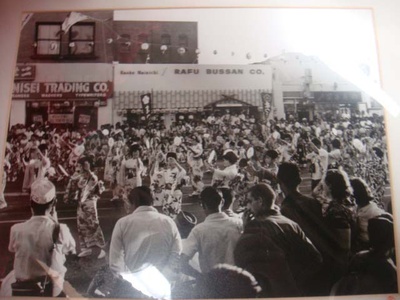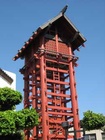It is hard to miss this wonderful gem of Los Angeles’s Little Tokyo District. With its big orange sign shaped like a fan and wide storefront windows to match, Rafu Bussan Inc. stands out as a landmark in the neighborhood. The front window displays a wide collection of Japanese import products—from books, to dolls, ceramics, chopsticks, earthenware, and vases—a selection which exemplifies the diversity of this 7,000 square foot store at the heart of Little Tokyo.
Rafu Bussan holds one of the longest histories in the Little Tokyo community, and has been a fixture there for 52 years. Since the store’s establishment in March 1958, Rafu Bussan continually increased its diversity and selection of inventory, and eventually grew out of its original location on First Street. In 1978, Rafu Bussan moved to its current location on Second Street, replacing the Oka Grill and Sho Tokyo Movie Theatre. While the store may have changed locations, it stayed true to its goal of diversity, selection, affordability, quality and community, through the efforts of its founders, Skip and Akio Kawaratani.
Since the store’s beginnings in 1958, the Kawaratani’s set out to provide their customers with a wide selection of unique and diverse products, carrying many of the basic, high demand Japanese commodities such as chopsticks, rice bowls, and origami paper. However, the store’s main goal and source of pride is the variety in selection and price range. Rafu Bussan caters to every customer, and their products range from modest to “priceless”. Those looking for a cute bowl or simple gift on a small budget can find an array of things to choose from, while those looking to splurge on that special something to add to their home will be just as satisfied here as well. What sets Rafu Bussan apart from the competition are the goods directly from Japan, which Mr. Kawaratani hand picks for the store, and are not available anywhere else. Modest or expensive, those looking for something unique and meaningful know Rafu Bussan is the place to go.
Equally important is the Kawaratani’s goal for Rafu Bussan to communicate the Japanese cultural heritage through their goods. The store maintains an impressive collection of one-of-a-kind traditional folk art pieces and Arita fine porcelain. Carol Tanita, who grew up with Rafu Bussan and has been working there for 30 years, calls these items “art pieces” or “heirloom pieces,” purchased for special occasions as gifts by “those who want to perpetuate the Japanese culture”. The store’s bestsellers include their earthenware pottery, ikebana (Japanese flower arrangement) vases and needles, as well as cultural gift wrappings such as thank you gifts and baby announcements, all profoundly cultural items. The history and tradition embedded in the items are an important part of the store’s mission to maintain and support Japanese culture in the community. Rafu Bussan’s customers include everyone from European collectors, who make a point of visiting at least once a year, to restaurants, tourists, and local Japanese-American families. The majority of Rafu Bussan’s business comes from word of mouth and referral, and they depend heavily on the continued support from longtime customers. These loyal customers are an integral part of their business and form what the Kawaratani’s see as the “foundation” of Rafu Bussan.
It is this sense of community that is the biggest source of pride for Mr. and Mrs. Kawaratani and Rafu Bussan. In an effort to give back to those who have given them so much, the Kawaratani’s regularly donate to the koban, the Little Tokyo community information center, and have been a part of the Nisei Week organization since its inception. One of the organizations particularly dear to the Kawaratani’s is Keiro Senior Healthcare, which is the largest healthcare provider serving the Japanese-American community. Keiro has supported Rafu Bussan since inception, helping it become the store it is today. Taking a trip down memory lane, Akio Kawaratani recalls the days when she and her husband were just starting out, and business was unusually slow. They would work from nine in the morning but rarely saw a customer until four in the afternoon. However, she will never forget the elderly woman who came in one day, all the way from Oxnard, and bought $17 worth of food (about $50 today). This woman, she says, is “forever immortalized in her heart.” For the past 52 years, Rafu Bussan has been a significant part of the community, and the Kawaratani’s truly feel the importance of this relationship. Those who come to their store are more than customers, they are family. Many will come in just to chat or say hello, but few leave without a bag in hand. The genuine sense of community and the continued support of their faithful customers is what gives the Kawaratani’s the encouragement to strive to do their best throughout the years.
** Discover Nikkei partnered with Professor Morgan Pitelka of Occidental College and his students taking the Spring 2010 seminar “Japanophilia: Orientalism, Nationalism, Transnationalism” on a meaningful community-based documentation project. The students interviewed owners of five long-time Little Tokyo businesses to create Nikkei Albums and articles.
View the Nikkei Album: Rafu Bussan Inc. Little Tokyo
© 2010 Katrina Senn





